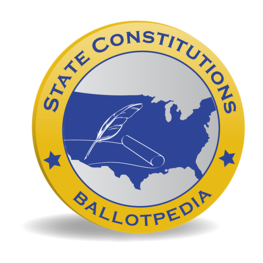Article IV, Iowa Constitution
| Iowa Constitution |
|---|

|
| Preamble |
| Articles |
| I • II • III • IV • V • VI • VII • VIII • IX • X • XI • XII |
Article IV of the Iowa Constitution is labeled Executive Department. It has 22 sections.
Section 1
| Text of Section 1:
Governor The supreme executive power of this state shall be vested in a chief magistrate, who shall be styled the governor of the state of Iowa.[1] |
Section 2
| Text of Section 2:
Election and Term The governor and the lieutenant governor shall be elected by the qualified electors at the time and place of voting for members of the general assembly. Each of them shall hold office for four years from the time of installation in office and until a successor is elected and qualifies.[1] |
Repealed and rewritten in 1988 with the approval of Amendment.
Section 3
| Text of Section 3:
Governor and Lieutenant Governor Elected Jointly--Returns of Elections The electors shall designate their selections for governor and lieutenant governor as if these two offices were one and the same. The names of nominees for the governor and the lieutenant governor shall be grouped together in a set on the ballot according to which nominee for governor is seeking office with which nominee for lieutenant governor, as prescribed by law. An elector shall cast only one vote for both a nominee for governor and a nominee for lieutenant governor. The returns of every election for governor and lieutenant governor shall be sealed and transmitted to the seat of government of the state, and directed to the speaker of the house of representatives who shall open and publish them in the presence of both houses of the general assembly.[1] |
Repealed and rewritten in 1988 with the approval of Amendment.
For statutory provisions, see §50.35 of the Code.
Section 4
| Text of Section 4:
Election by General Assembly in Case of Tie--Succession by Lieutenant Governor The nominees for governor and lieutenant governor jointly having the highest number of votes cast for them shall be declared duly elected. If two or more sets of nominees for governor and lieutenant governor have an equal and the highest number of votes for the offices jointly, the general assembly shall by joint vote proceed, as soon as is possible, to elect one set of nominees for governor and lieutenant governor. If, upon the completion by the general assembly of the canvass of votes for governor and lieutenant governor, it appears that the nominee for governor in the set of nominees for governor and lieutenant governor receiving the highest number of votes has since died or resigned, is unable to qualify, fails to qualify, or is for any other reason unable to assume the duties of the office of governor for the ensuing term, the powers and duties shall devolve to the nominee for lieutenant governor of the same set of nominees for governor and lieutenant governor, who shall assume the powers and duties of governor upon inauguration and until the disability is removed. If both nominees for governor and lieutenant governor are unable to assume the duties of the office of governor, the person next in succession shall act as governor.[1] |
Repealed and rewritten in 1988 with the approval of Amendment.
Section 5
| Text of Section 5:
Contested Elections Contested elections for the offices of governor and lieutenant governor shall be determined by the general assembly as prescribed by law.[1] |
Repealed and rewritten in 1988 with the approval of Amendment.
For statutory provisions, see §58.1 through 58.7 of the Code.
Section 6
| Text of Section 6:
Eligibility No person shall be eligible to the office of governor, or lieutenant governor, who shall not have been a citizen of the United States, and a resident of the state, two years next preceding the election, and attained the age of thirty years at the time of said election.[1] |
Section 7
| Text of Section 7:
Commander in Chief The governor shall be commander in chief of the militia, the army, and navy of this state.[1] |
Section 8
| Text of Section 8:
Duties of Governor He shall transact all executive business with the officers of government, civil and military, and may require information in writing from the officers of the executive department upon any subject relating to the duties of their respective offices.[1] |
Duty as to state accounts, §70A.8 of the Code.
Section 9
| Text of Section 9:
Execution of Laws He shall take care that the laws are faithfully executed.[1] |
Section 10
| Text of Section 10:
Vacancies When any office shall, from any cause, become vacant, and no mode is provided by the constitution and laws for filling such vacancy, the governor shall have power to fill such vacancy, by granting a commission, which shall expire at the end of the next session of the general assembly, or at the next election by the people.[1] |
Section 11
| Text of Section 11:
Convening General Assembly He may, on extraordinary occasions, convene the general assembly by proclamation, and shall state to both houses, when assembled, the purpose for which they shall have been convened.[1] |
See also Art. III, §2.
Section 12
| Text of Section 12:
Message He shall communicate, by message, to the general assembly, at every regular session, the condition of the state, and recommend such matters as he shall deem expedient.[1] |
Section 13
| Text of Section 13:
Adjournments In case of disagreement between the two houses with respect to the time of adjournment, the governor shall have power to adjourn the general assembly to such time as he may think proper; but no such adjournment shall be beyond the time fixed for the regular meeting of the next general assembly.[1] |
Section 14
| Text of Section 14:
Disqualification No persons shall, while holding any office under the authority of the United States, or this state, execute the office of governor, or lieutenant governor, except as hereinafter expressly provided.[1] |
Section 15
| Text of Section 15:
Terms--Compensation The official terms of the governor and lieutenant governor shall commence on the Tuesday after the second Monday of January next after their election and shall continue until their successors are elected and qualify. The governor and lieutenant governor shall be paid compensation and expenses as provided by law. The lieutenant governor, while acting as governor, shall be paid the compensation and expenses prescribed for the governor.[1] |
Repealed and rewritten in 1988 with the approval of Amendment.
Section 16
| Text of Section 16:
Pardons--Reprieves--Commutations The governor shall have power to grant reprieves, commutations and pardons, after conviction, for all offences except treason and cases of impeachment, subject to such regulations as may be provided by law. Upon conviction for treason, he shall have power to suspend the execution of the sentence until the case shall be reported to the general assembly at its next meeting, when the general assembly shall either grant a pardon, commute the sentence, direct the execution of the sentence, or grant a further reprieve. He shall have power to remit fines and forfeitures, under such regulations as may be prescribed by law; and shall report to the general assembly, at its next meeting, each case of reprieve, commutation, or pardon granted, and the reasons therefore; and also all persons in whose favor remission of fines and forfeitures shall have been made, and the several amounts remitted.[1] |
Section 17
| Text of Section 17:
Lieutenant Governor to Act as Governor In case of the death, impeachment, resignation, removal from office, or other disability of the governor, the powers and duties of the office for the residue of the term, or until he shall be acquitted, or the disability removed, shall devolve upon the lieutenant governor.[1] |
Referred to in §7.14 of the Code.
Section 18
| Text of Section 18:
Duties of Lieutenant Governor The lieutenant governor shall have the duties provided by law and those duties of the governor assigned to the lieutenant governor by the governor.[1] |
Repealed and rewritten in 1988 with the approval of Amendment.
Section 19
| Text of Section 19:
Succession to Office of Governor and Lieutenant Governor If there be a vacancy in the office of the governor and the lieutenant governor shall by reason of death, impeachment, resignation, removal from office, or other disability become incapable of performing the duties pertaining to the office of governor, the president of the senate shall act as governor until the vacancy is filled or the disability removed; and if the president of the senate, for any of the above causes, shall be incapable of performing the duties pertaining to the office of governor the same shall devolve upon the speaker of the house of representatives; and if the speaker of the house of representatives, for any of the above causes, shall be incapable of performing the duties of the office of governor, the justices of the supreme court shall convene the general assembly by proclamation and the general assembly shall organize by the election of a president by the senate and a speaker by the house of representatives. The general assembly shall thereupon immediately proceed to the election of a governor and lieutenant governor in joint convention.[1] |
Repealed and rewritten in 1988 with the approval of Amendment.
Referred to in §7.14(2) of the Code.
Section 20
| Text of Section 20:
Seal of State There shall be a seal of this state, which shall be kept by the governor, and used by him officially, and shall be called the Great Seal of the State of Iowa. See chapter 1A of the Code for a description of the great seal of Iowa.[1] |
Section 21
| Text of Section 21:
Grants and Commissions All grants and commissions shall be in the name and by the authority of the people of the state of Iowa, sealed with the great seal of the state, signed by the governor, and countersigned by the secretary of state.[1] |
Section 22
| Text of Section 22:
Secretary--Auditor--Treasurer A secretary of state, an auditor of state and a treasurer of state shall be elected by the qualified electors at the same time that the governor is elected and for a four-year term commencing on the first day of January next after their election, and they shall perform such duties as may be provided by law.[1] |
Repealed and rewritten in 1972 with the approval of Amendment.
See also
- State constitution
- Constitutional article
- Constitutional amendment
- Constitutional revision
- Constitutional convention
- Amendments
External links
Additional reading
- Iowa, Benjamin Franklin Shambaugh (1902). The Constitution of the State Of Iowa, State Historical Society of Iowa
- Stark, Jack (1998). The Iowa State Constitution: A Reference Guide, Westport, Connecticut: Greenwood Press
Footnotes
| ||||||||||||||||
 |
State of Iowa Des Moines (capital) |
|---|---|
| Elections |
What's on my ballot? | Elections in 2024 | How to vote | How to run for office | Ballot measures |
| Government |
Who represents me? | U.S. President | U.S. Congress | Federal courts | State executives | State legislature | State and local courts | Counties | Cities | School districts | Public policy |

